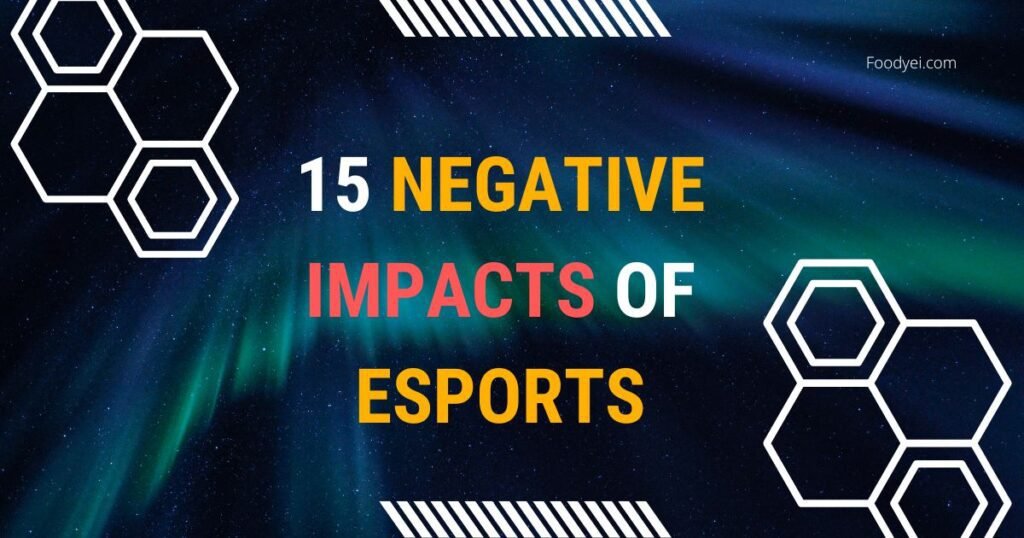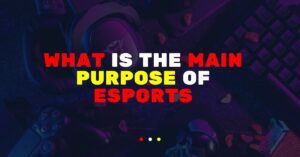Esports have exploded in popularity in recent years, enthralling millions of followers all around the world. With its rapid growth and increasing mainstream recognition, it’s essential to explore the potential negative impact of this booming industry. While esports offers numerous benefits and opportunities, it also presents some concerns that warrant our attention. We’ll explore the negative Impacts of esports and look at how they could harm people and society
15 Negative Impact of Esports
The Rise of Esports: A Global Phenomenon
Esports, short for electronic sports, refers to competitive video gaming where professional players or teams compete against each other in various multiplayer games. It has evolved from a niche hobby into a multi-billion dollar industry, attracting substantial investments from sponsors, advertisers, and media organizations. Esports tournaments now fill arenas, and the prize pools rival those of traditional sports events. However, the rapid growth of esports brings forth a range of concerns that need careful consideration.
Sedentary Lifestyle and Health Issues
One of the primary concerns associated with esports is the sedentary lifestyle it promotes. Engaging in extended periods of gameplay often leads to a lack of physical activity, contributing to various health issues such as obesity, cardiovascular problems, and musculoskeletal disorders. Sitting for long hours in front of a screen can have detrimental effects on posture, eyesight, and overall well-being.
Addiction and Mental Well-being
Esports addiction is a growing problem that can have severe consequences on individuals’ mental health. The immersive nature of gaming, coupled with the constant desire for improvement and the social recognition that comes with success, can lead to addictive behaviors. Excessive gaming can result in social withdrawal, poor academic or professional performance, depression, anxiety, and other mental health disorders.
Negative Impact on Academic Performance
For many young individuals, esports can become a significant distraction, negatively impacting their academic performance. Spending excessive time on gaming can lead to reduced study hours, lack of focus, and poor time management skills. This can result in lower grades, missed educational opportunities, and limited future prospects.
Social Isolation and Lack of Interpersonal Skills
While esports connects individuals through online gaming communities, it can also contribute to social isolation and a lack of interpersonal skills. Excessive gaming can lead to withdrawal from real-life social interactions, leaving individuals with limited face-to-face communication abilities. This can hinder personal relationships, hinder social development, and impede the ability to collaborate effectively in a professional setting.
Financial Burdens and Exploitation
While the top esports athletes enjoy lucrative contracts and endorsements, the majority of aspiring gamers face financial burdens and exploitation. Many young players invest significant time and resources into pursuing a professional gaming career, often at the expense of their education or other opportunities. However, only a small fraction achieves success, leaving the rest struggling to cope with the financial consequences of their dedication.
Impact on Traditional Sports and Physical Activities
Esports’ rapid rise has raised concerns about its impact on traditional sports and physical activities. With the younger generation increasingly drawn to gaming, the participation rates in physical sports may decline. This shift can have adverse effects on public health, community engagement, and the overall development of well-rounded individuals.

Gender Inequality and Stereotyping
Gender inequality and stereotyping persist within the esports industry. Female gamers often face discrimination, harassment, and unequal opportunities compared to their male counterparts. The underrepresentation of women in professional esports perpetuates gender stereotypes and limits the industry’s diversity and inclusivity.
Online Harassment and Toxicity
Esports communities, like any online space, are not immune to toxic behavior. The anonymity provided by online gaming platforms can foster a hostile environment where harassment, bullying, and toxic language prevail. This toxic culture not only affects individual players but also tarnishes the reputation of esports as a whole.
Unrealistic Expectations and Burnout
The competitive nature of esports can lead to unrealistic expectations and intense pressure on players. Young gamers aspiring to turn professional often face immense stress to perform at their peak, maintain a high level of skill, and secure sponsorship deals. Burnout, tiredness, and a loss in mental and physical health are all possible effects of this strain.
Lack of Work-Life Balance
For esports professionals, maintaining a healthy work-life balance can be challenging. The demanding training schedules, frequent travel, and constant pressure to perform can leave players with little time for personal relationships, leisure activities, and self-care. This imbalance can lead to increased stress levels and hinder overall life satisfaction.
Environmental Concerns
The environmental impact of esports is an emerging concern. The energy consumption associated with powering gaming equipment, data centers, and hosting large-scale tournaments contributes to carbon emissions and environmental degradation. As the industry continues to grow, it becomes crucial to explore sustainable practices and minimize the ecological footprint of esports.
Cultural and Ethical Challenges
As esports transcends borders, it brings forth cultural and ethical challenges. Different countries and regions have varying regulations and values regarding gaming and esports. Issues such as game addiction, gambling, doping, and match-fixing pose complex ethical dilemmas that require careful consideration and global cooperation.
Governance and Regulatory Issues
Esports’ rapid expansion has outpaced the development of robust governance and regulatory frameworks. The lack of standardized policies and guidelines leaves room for exploitation, cheating, and unfair treatment within the industry. Establishing comprehensive governance structures and effective regulations is essential to ensure the long-term sustainability and integrity of esports.
Balancing the Scale: Addressing the Negative Impact
To address the negative impact of esports, a multi-faceted approach is required. Education and awareness programs can promote responsible gaming habits, mental health support, and healthy lifestyles. Regulatory bodies and industry leaders must collaborate to establish ethical standards, fair competition, and protect the well-being of players. Furthermore, promoting inclusivity, diversity, and gender equality can help create a more welcoming and supportive esports community.
Conclusion:
While esports has brought excitement and innovation to the world of entertainment, it is crucial to recognize the potential negative impact it can have. From sedentary lifestyles and addiction to social isolation and financial burdens, esports presents a range of challenges that demand our attention. By acknowledging and addressing these issues, we can strive to create a sustainable and inclusive esports industry that benefits individuals and society as a whole.
FAQs:
Is esports harmful to physical health?
Esports can contribute to a sedentary lifestyle, leading to various health issues. It is important to balance gaming with physical activity and practice good posture and eye care.
Can esports addiction affect mental well-being?
Yes, excessive gaming can lead to addiction and have detrimental effects on mental health, including social withdrawal, depression, and anxiety.
Does esports impact academic performance?
Excessive gaming can distract individuals from their studies and negatively impact academic performance. It is important to find a balance between gaming and educational responsibilities.
Are there gender inequalities in esports?
Unfortunately, gender inequalities persist in esports, with female gamers facing discrimination, harassment, and limited opportunities compared to male gamers.
What steps can be taken to address the negative impact of esports?
Education, awareness programs, regulatory frameworks, and promoting inclusivity and diversity are key steps in addressing the negative impact of esports.




